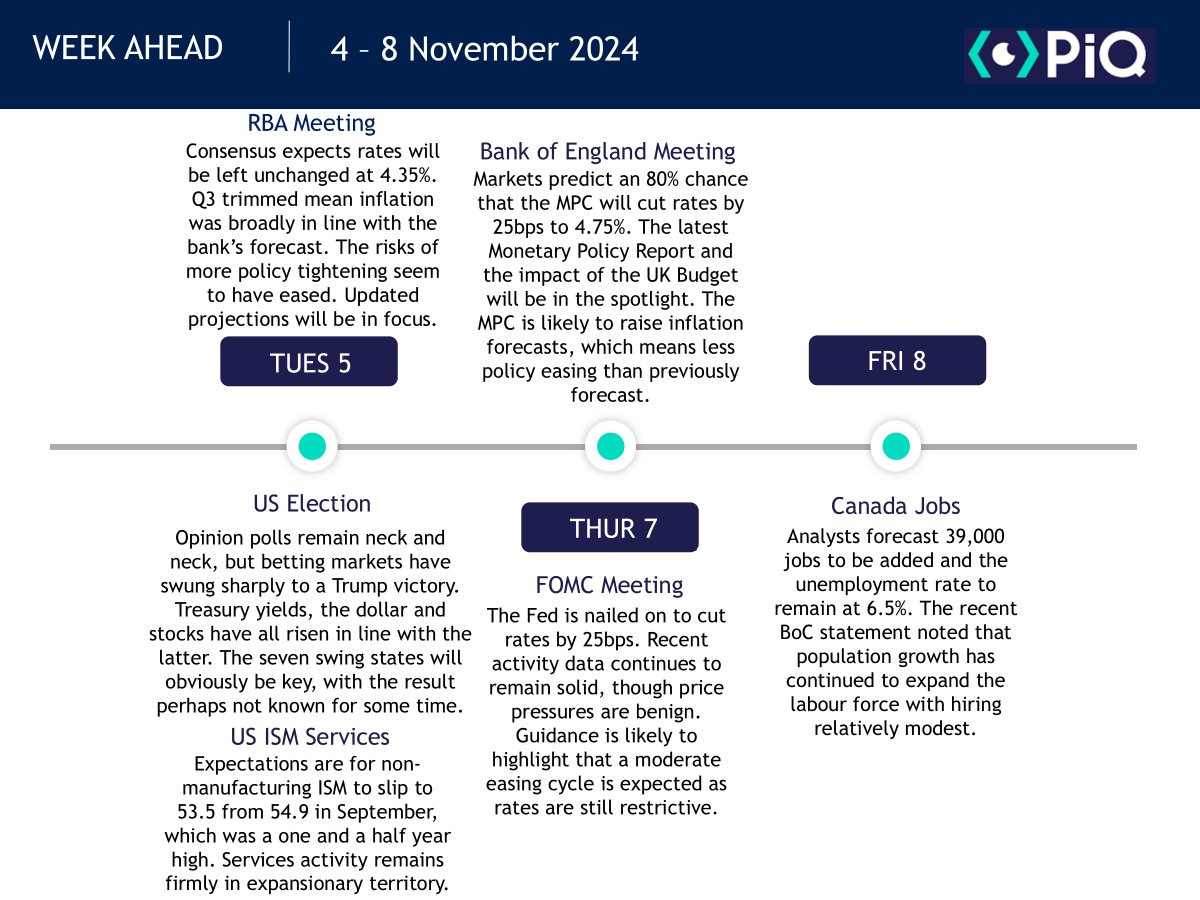PiQ and Zack Eiseman provide you a consolidated roundup of the overnight news that matters most to markets.
ELECTION:
Yields and the Dollar gapped lower on the open after the implied probability of Harris winning the election on betting websites rose over the weekend; she is now implied at 44% and 48% on Polymarket and Kalshi, respectively, from 39% and 44% on Friday.
Harris leads among likely voters in Iowa, a state Trump won by more than eight points four years ago, according to the closely watched Selzer poll that suggests women in the Midwest could be driving a late surge in support for Harris. (FT)
NYT/Sienna final poll finds Harris showing new strength in North Carolina and Georgia as Trump erases her lead in Pennsylvania and maintains his advantage in Arizona. (NYT)
NYT/Sienna poll shows signs that late deciders are breaking for Harris where among the 8% of voters who said they had only recently decided on their vote, she wins the group by 55% to 44%. (NYT)
NYT/Sienna poll shows all Democratic candidates for Senate are outperforming Harris, an indication that a potentially crucial slice of voters may split their tickets by supporting both Trump and the Democratic candidate for Senate in their state. (NYT)
Harris’s team shifts its view to no longer consider themselves as the underdog. (WaPo)
Harris is struggling to secure the support of male volunteers in some labor unions whose phone calls and house visits are needed to get Democratic supporters out to vote. (RTRS)
Authorities are touting unprecedented security plans designed to withstand violence and other nightmare scenarios on Election Day and in a potentially uncertain aftermath. (WaPo)
MACRO:
Oil has gapped open higher amid Iran tensions and after OPEC+ agreed to delay a planned December oil output increase by one month, as weak demand notably from China and rising supply outside the group maintain downward pressure on the oil market. (RTRS)
Hopes that the US election may prompt big “bazooka” China stimulus markets have hoped for are wishful thinking, WSJ sources note, who say a bazooka isn’t coming—at least not this year. (WSJ)
It may be months before detailed plans to support Chinese consumption come into focus with December or March policy meetings seen as next key dates to watch for clues about consumer spending measures. (BBG)
Early indicators of China’s biggest shopping event of the year, Singles Day, reveal a pickup in select categories amid expectations of modest growth in overall sales. (CNBC)
Chinese authorities are demanding wealthy individuals and companies double-check their taxes for unpaid liabilities in a move that threatens to further dent investor confidence. (FT)
Private firms in China are in a “precarious” situation as debt-ridden local governments increasingly seek to boost earnings through harsh criminal law enforcement, lawyers and observers have warned. (SCMP)
Home sales growth momentum in major Chinese cities continues into November. (@YuanTalks)
China’s economic recovery in Q4 is well-supported by government policies that boost household incomes and consumption, according to analysts in China press. (CSJ)
China has urged France to take on "an active role" to push the EU towards a solution acceptable to both the European and Chinese EV industries. (RTRS)
Federal Reserve officials are expected to cut interest rates by 25bps on Thursday. Officials would like to avoid the spotlight amid the election. Questions remain, however, on the extent of easing beyond this meeting. (WSJ)
Warren Buffett and Berkshire Hathaway extended their retreat from stocks in the third quarter, further slashing holdings in Apple and boosting cash to a record $325.2 billion. (RTRS)
Analysts warn the US factory boom as a result of IRA and Chips Act could be at risk under Trump amid his criticism of the laws, labelling them as giveaways to companies. (WSJ)
US food distributors are having an outsized impact on food inflation rates for consumers amid complaints of obscure charges being made by the middle men between food producers and grocery stores. (WSJ)
Germany’s coalition government appears on the brink of collapse over budget disagreements and is seen as unlikely to last until the next election in September 2025. (NYT)
German Scholz will hold meetings with his top two ministers to seek common ground after they put forward contradictory plans to fix the nation's economy. (RTRS)
UK PM Starmer promised reforms to speed up the economy and overhaul the public sector after the Labour government's first budget failed to boost the growth outlook. (FT)
UK Chancellor Reeves has suggested UK businesses can “absorb” her increases to employer national insurance contributions by accepting reduced profits or making efficiencies, rather than passing on lower wage rises to workers. (FT)
UK home sales expected to "jump” at the beginning of next year as people try to buy before the rise in stamp duty, according to Nationwide. (BBC)
Australian PM Albanese said the government planned to cut student loans for around three million Australians by 20%, wiping off around A$16 billion ($10 billion) in debts. (RTRS)
RBNZ has warned that concerns about geopolitical tension have been increasing recently and that potential impacts from those risks could not be underestimated. (RTRS)
Turkey’s headline inflation eased slightly less than expected last month, likely reinforcing the view among economists that an interest-rate cut is off the table this year. (BBG)
Foreign investors fear India’s stock market boom may be over after foreign investors pulled more than $10bn out of the region in October, the biggest outflow since COVID. (FT)
GEOPOLITICAL:
Iran is planning a complex response involving even more powerful warheads and other weapons, said Iranian and Arab officials briefed on the plans. How the Israeli response plays out will depend on the size, nature and effectiveness of Tehran’s threatened strike. (WSJ)
Iran doesn’t want to influence the U.S. election with its attack, where the response would come after Tuesday’s voting but before a new president is inaugurated in January. (WSJ)
Iranian Foreign Ministry spokesmen said Iran will use full strength in response to Israel. (Newsquawk)
A suspected leak of classified Gaza documents involving an aide to PM Netanyahu has jolted Israeli politics and outraged the families of hostages held by Hamas. (RTRS)
North Korea said it has no choice but to continue efforts to build up capabilities for self-defense and accused the US and South Korea of pushing the Korean Peninsula into war scenarios. (RTRS)
EQUITIES:
Intel will be replaced by Nvidia on the Dow Jones index after a 25-year run. (RTRS)
Nvidia CEO Huang had asked memory chip maker SK Hynix to bring forward by six months the supply of its next-generation high-bandwidth memory chips called HBM4. (RTRS)
Morgan Stanley notes Nvidia has agreed to a 5% price hike on TSMC 3nm chip production and 10%-20% on CoWoS advanced packaging, depending on how much TSMC is able to expand capacity. (CTEE)
Nvidia has already reserved half of TSMC’s CoWoS advanced packaging next year, while Microsoft, Amazon, Google and others fight over the rest as CoWoS demand continues to rise. (CNA)
Walt Disney is forming a new group to coordinate the company's use of AI and mixed reality, as the media giant explores applications across its film, television and theme park divisions. (RTRS)
Schneider Electric removed Peter Herweck from his role as CEO due to differences on the implementation of the company’s roadmap, and appointed Olivier Blum as his replacement. (WSJ)
Ryanair reported a fall in first-half net profit, missing analysts forecasts, and said it expects to carry fewer passengers in fiscal 2026 than forecast due to delays in Boeing plane deliveries. (WSJ)
TSMC Arizona plans to hold a celebration in December for the completion of its 1st fab and the 1st TSMC 4nm chips produced outside Taiwan. (UDN)
SK Hynix and Samsung Electronics are cutting output of older DRAM chips as China firms ramp output, lowering prices. (KED)
Samsung’s semiconductor division held a meeting Sunday to revamp its mid-to-long-term strategy planning. (Business Korea)
Chinese EV stocks jumped after automakers including BYD Co. posted record deliveries in October, as government subsidies give a widespread lift to the sector. (BBG)
China’s top coal producers are accelerating a move into power generation as fuel prices drop and electrification takes center stage in China’s low-carbon transition. (BBG)
Westpac said its annual net profit fell by 3%, but signaled hopes that demand for housing and business credit will rise in 2025 as Australia’s central bank joins global counterparts in cutting interest rates. (WSJ)
Anglo American sold its interest in two steelmaking-coal mines in Australia for around $1.1 billion, advancing its coal-division selloff. (WSJ)
AI’s huge power needs give oil majors incentive to invest in renewables, says Adnoc boss. (FT)
Sabic, Saudi Arabia’s biggest chemical company, missed analysts’ profit estimates last quarter as the industry continues to grapple with a challenging downturn. (BBG)
Listen!
The Morning Blast
Join Michael and Ryan for an explosive daily market preview.
We take 15 minutes (ish) to help you kickstart your trading day.
📆 This week's significant economic data
That's all for today's digest. Happy trading, and keep it tight!
Team PiQ







One roundup to rule them all